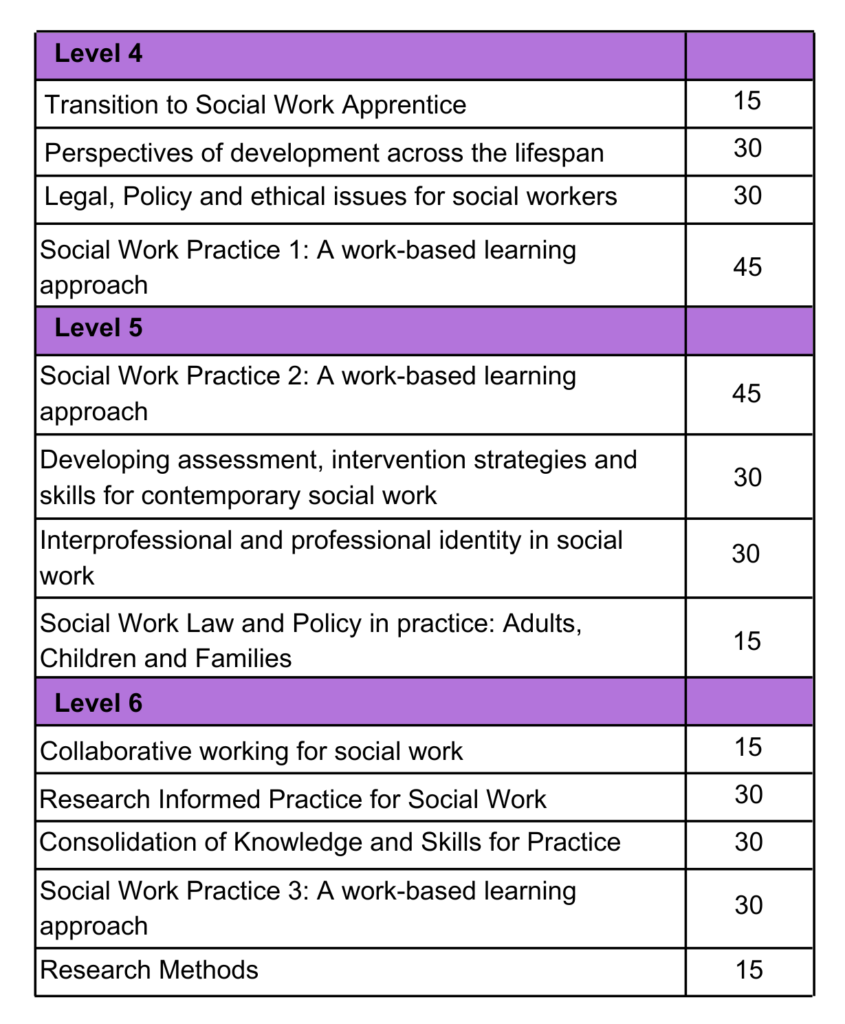Welcome to the Social Work section of this online resource. Please take a moment to familiarise yourself with this programme, and don’t hesitate to get in touch with the Programme team for any queries.
Programme Intent
The philosophy of this programme is built on a foundation of person-centred care and quality improvement and has been designed to equip the apprentice with a comprehensive understanding of the key theoretical and practice issues in current social work delivery.
Implementation
A blended and flexible learning journey supports learners to contextualise understanding; drawing on peers, practitioners and academics to deliver a personalised learning experience, with learning applied directly into the workplace.
Impact
The programme affords learners the opportunity to acquire the knowledge, skills and experiences to apply for registration as a Social Worker with Social Work England (SWE) and to become members of the British Association of Social Workers (BASW). The programme aligns with all required benchmarks and standards including those related to the degree apprenticeship.
Key Contacts
| Role | Name | Contact |
| Senior Lecturer | Carole Baxter | c.baxter4@herts.ac.uk |
| Professional Lead | Vida Douglas | v.douglas@herts.ac.uk |
| Senior Lecturer/Apprenticeship Coach | Nicole Jefferson | n.jefferson@herts.ac.uk |
| Senior Lecturer | David Mwanza | d.mwanza@herts.ac.uk |
| Senior Lecturer in Social Work | Anthony Novak | a.novak@herts.ac.uk |
| Programme Lead for BSc (Hons) Social Work degree | Muna Sabbagh | m.sabbagh@herts.ac.uk |
| General enquiries | SWDAgeneral@herts.ac.uk |
Programme Visual

Preparing for EPA
The role of the mentor and preparation for the EPA includes:
- Undertaking relevant training provided by the University to ensure they are aware of proper policies and procedures relating to apprenticeships and what is expected from the apprentice in the workplace and at the University and develop themselves as mentors.
- Familiarise themselves with any Course, Placement or Apprenticeship Handbooks and associated review paperwork.
- Familiarise themselves with the apprenticeship standards and the associated knowledge, skills and behaviours which the apprentice will need to demonstrate.
- Have a sound knowledge and understanding of what the apprentice is learning during their academic studies and help the apprentice to use this to inform their own practice.
- Be prepared for and participate in the quarterly tripartite reviews and ensure any actions highlighted are facilitated. (Duration approximately 1 hr for each review).
- Develop a transparent, honest and open relationship with the apprentice to facilitate a safe learning environment in the workplace.
- Provide regular process meetings and honest feedback to facilitate the professional development of the apprentice. Ensure that a bespoke work-based learning plan is in place identifying opportunities for the learner. The plan contributes to ensuring that your journey as an apprentice is individualised (though not limited) to your specific workplace.
- Support the apprentice to increase the use of their initiative and to take increasing responsibility for their learning and development as they progress through the programme.
- Facilitate the apprentice to undertake and record their work-based task/learning in their portfolio in an appropriate way and to maintain this portfolio as a record of their learning across the apprenticeship, ready for the EPA.
- Support the apprentice to recognise opportunities for learning within day-to-day work in their workplace.
- Ensure there is clear, timely communication with the University about the apprentice and their development. Ensuring any difficulties are identified early and an appropriate action plan is put in place to provide enhanced support promotes a positive perception of apprenticeships as a route into social work.
- Contribute to the decision as to whether the apprentice is ready to go through the End-Point Assessment.
Sample mapping of your KSB’s to modules









